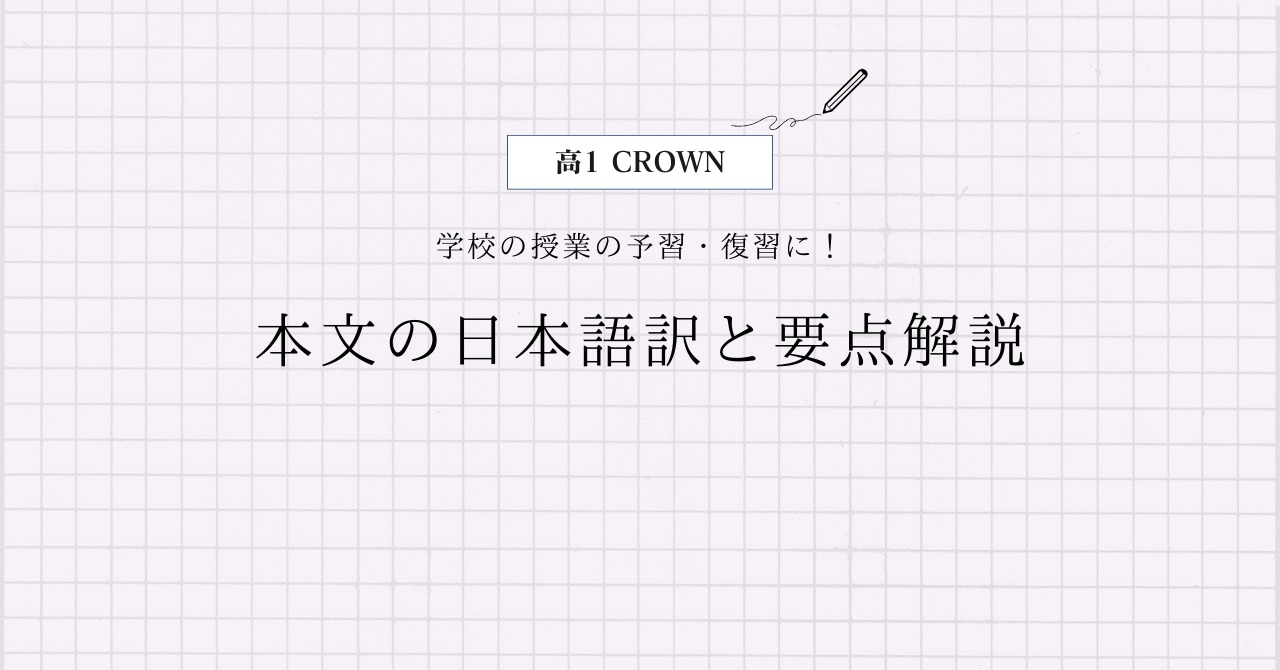三省堂 高1CROWN English Communication1 Lesson5 Section1の本文の日本語訳と重要箇所の解説です。
Section5-2, 5-3, 5-4の解説はこちらからご覧ください。
>高1CROWN English Communication1 Lesson5 Section2 本文和訳
>高1CROWN English Communication1 Lesson5 Section3 本文和訳
>高1CROWN English Communication1 Lesson5 Section4 本文和訳
- CROWN English Communication1 Lesson5 Section1 本文と日本語訳
- CROWN English Communication1 Lesson5 Section1 重要事項の解説
- Roots & Shoots
- Jane Goodall is famous not only for her work with chimpanzees but also for her effort to conserve nature.
- Here, Ken interviews her about her life and work.
- Dr. Goodall, thank you for taking time for this interview.
- I know that you spent many years studying chimpanzees in Africa.
- When did you first decide to go to Africa?
- It was after I had read the Doctor Dolittle and the Tarzan books.
- When I was 11, I knew that somehow I would go to Africa to live with animals, study them, and write books about them.
- I’m sure there are lots of young people who want to work with animals someday.
- How can they prepare themselves?
- There are a lot of things you can do in order to understand animals.
- It is very important that you watch them and observe their behavior.
- It is also important that you write notes and ask questions.
- If you are really determined, you’ll have to work really hard.
- Take advantage of every opportunity, and don’t give up.
- CROWN English Communication1 Lesson5 Section1 まとめ
CROWN English Communication1 Lesson5 Section1 本文と日本語訳
Roots & Shoots
「根と芽」
Jane Goodall is famous not only for her work with chimpanzees but also for her effort to conserve nature.
「ジェーン・グドールはチンパンジーに関する取り組みだけでなく,自然保護のための尽力でも有名です。」
Here, Ken interviews her about her life and work.
「ここでは,ケンが彼女の人生と仕事についてインタビューしています。」
Ken: Dr. Goodall, thank you for taking time for this interview.
「グドール博士,インタビューのお時間をいただきありがとうございます。」
I know that you spent many years studying chimpanzees in Africa.
「あなたはアフリカでチンパンジーの研究に何年も費やしたということを知っています。」
When did you first decide to go to Africa?
「そもそも,いつアフリカに行こうと決めたのですか?」
Jane: It was after I had read the Doctor Dolittle and the Tarzan books.
「それは『ドリトル先生』や『ターザン』を読んだ後でした。」
When I was 11, I knew that somehow I would go to Africa to live with animals, study them, and write books about them.
「私が11歳のとき,どういうわけか私は動物と一緒に暮らし,動物を研究し,そして動物に関する本を書くためにアフリカに行くだろうと分かったのです。」
Ken: I’m sure there are lots of young people who want to work with animals someday.
「きっと,いつか動物に関する取り組みをしたいという若い人たちがたくさんいると思います。」
How can they prepare themselves?
「彼らはどのように準備できますか?」
Jane: There are a lot of things you can do in order to understand animals.
「動物を理解するためにできることはたくさんあります。」
It is very important that you watch them and observe their behavior.
「動物を見て,彼らの行動を観察することがとても重要です。」
It is also important that you write notes and ask questions.
「また,メモを書き,質問をすることも重要です。」
If you are really determined, you’ll have to work really hard.
「もしあなたが本当に決心したら,本当に一生懸命取り組まなけらばならないでしょう。」
Take advantage of every opportunity, and don’t give up.
「すべての機会を生かし,そして諦めないでください。」

CROWN English Communication1 Lesson5 Section1 重要事項の解説
Roots & Shoots
“root”は「根,本質」,“shoot”は「芽,発射」という名詞です。
Jane Goodall is famous not only for her work with chimpanzees but also for her effort to conserve nature.
“be famous for~”は「~で有名だ」,“not only A but also B”は「AだけでなくBも」という重要表現になります。
“work”は「仕事,取り組み」という名詞で,“work with~”で「~に関する取り組み,~と一緒に働く」といった意味になります。“chimpanzee”は「チンパンジー」ですね。
“effort”は「努力,尽力」という名詞で,“conserve”は「を保護する,保存する」という動詞,“nature”は「自然」という名詞です。
また,“to conserve”は「不定詞の形容詞的用法」となり,直前の“her effort”を修飾しています。
Here, Ken interviews her about her life and work.
“here”は「ここでは,ここに」といった副詞ですね。
“interview”は「にインタビューする,面接する」という動詞で,“life”は「生活,人生」という名詞です。
Dr. Goodall, thank you for taking time for this interview.
“thank you for~”は「~してくれてありがとう」という表現で,“for”が前置詞なので“taking”と「動名詞」になっていますね。
“take time”は「時間を取る・かける」という意味で,ここの“interview”は「インタビュー」という名詞です。
I know that you spent many years studying chimpanzees in Africa.
“that”は「接続詞」ですね。
“spent”は“spend(を過ごす,費やす)”の過去形で,“spend 時間 動詞のing形”で「~するのに時間を費やす」という重要表現になります。
“study”は「を研究する」という意味もありますよ。
When did you first decide to go to Africa?
“first”は「初めて,そもそも」という副詞です。
“decide”は「を決める」という動詞で,“decide to 動詞の原形”は「~することを決める」という重要表現になります。
It was after I had read the Doctor Dolittle and the Tarzan books.
“It”は直前の文全体を指しています。
“after”は「~の後で」という接続詞で,この後の文は「過去完了」になっていますね。
「本を読む」→「アフリカに行くと決める」という,過去の出来事の時系列を表すために過去完了になっています。
“Doctor Dolittle”は「ドリトル先生」,“Tarzan”は「ターザン」という本です。
When I was 11, I knew that somehow I would go to Africa to live with animals, study them, and write books about them.
この文では「接続詞when」が使われていて,“knew”の後ろの“that”は「接続詞」ですね。
“somehow”は「どういうわけか,何とかして」という副詞です。
“would”は“will”の過去形で,“to live/study/write”は「不定詞の副詞的用法」になっています。
“them”はすべて“animals”を指していますね。
I’m sure there are lots of young people who want to work with animals someday.
“be sure (that)~”は「きっと~だと思う」という重要表現になります。
また,ここでは「there構文」が使われていますね。
“lots of~”は“a lot of~”と同じく「たくさんの」という意味になります。
また,“who”は「主格の関係代名詞」で,“who want to work with animals someday”が先行詞“lots of young people”を修飾していますね。
“someday”は「いつか」という副詞になります。
How can they prepare themselves?
“how”は「どう,どうやって,どのように」という疑問詞ですね。
“they”は“lots of young people”を指しています。
“prepare oneself”は「準備する」という意味,“themselves”は「彼ら自身」という再帰代名詞で,主語と目的語が同じになるときは,目的語を再帰代名詞を使って表現します。
There are a lot of things you can do in order to understand animals.
ここでも「there構文」が使われていますね。
またこの文では「目的格の関係代名詞that/which」が省略されていて,“you can do in order to understand animals”が先行詞“a lot of things”を修飾していますね。
“thing”は「もの,こと」という名詞で,“in order to 動詞の原形”は「~するために」という重要表現になります。
“understand”は「を理解する」という動詞です。
It is very important that you watch them and observe their behavior.
“It”は形式主語で,”that”以下の内容が真の主語となります。
“them,their”は“animals”を指していて,“observe”は「を観察する」という動詞,“behavior”は「行動,振る舞い」という名詞になります。
It is also important that you write notes and ask questions.
この文も“It”は形式主語で,”that”以下の内容が真の主語となります。
“also”は「また,さらに」といった副詞で,付け加える役割があります。色々な文で使うので必ず覚えましょう!
“note”は「メモ」という名詞で,“ask”は「を尋ねる」という動詞ですね。
If you are really determined, you’ll have to work really hard.
この文では「接続詞if」が使われていますね。
“be determined”は「決心する」という重要表現になります。
“have to 動詞の原形”は助動詞“must”と同じ「~しなければならない」という意味で,“will”とくっついて「~しなければならないだろう」という未来の意味になっていますね。
“hard”は「一生懸命に」という副詞です。
Take advantage of every opportunity, and don’t give up.
“take advantage of~”は「を生かす,利用する」という重要表現になります。
“every”は「すべての,どの」という形容詞ですが,後ろに置く名詞は必ず単数形になり,全体としても単数扱いです。
“opportunity”は「機会」という名詞ですね。
“give up”は「諦める」という重要表現で,ここでは「否定の命令文」になっています。

CROWN English Communication1 Lesson5 Section1 まとめ
以上がCROWN English Communication1 Lesson5 Section1の日本語訳となります。
「関係代名詞」などの使い方をしっかり確認しておきましょう!
>高1CROWN English Communication1 Lesson5 Section2 本文和訳
>高1CROWN English Communication1 Lesson5 Section3 本文和訳
>高1CROWN English Communication1 Lesson5 Section4 本文和訳
何か分からない点や他に解説してほしい点があれば,お気軽にコメントしてください!




コメント